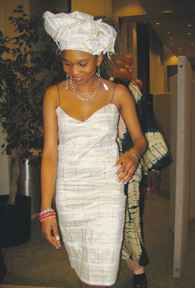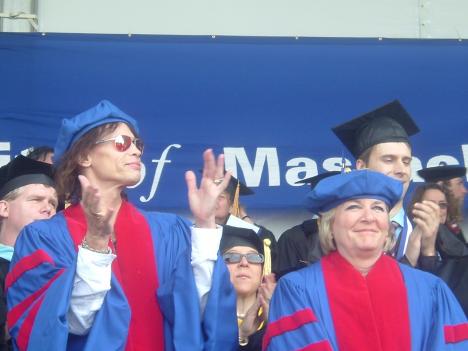Culture is Amazing

Negar Mortazavi
Sandra, strutting her stuff at the African Hut Club´s fifth annual African Night.
April 30, 2005
By Jordan ColonStaff Writer
UMass Boston is known for the lame campus/student events it attempts to put on (remember “fest-of-us”). Not to be negative, but there are very few successful events at UMB, and by successful I mean more than 10 people show up for the actual event and not the food being served. There are many reasons for this; we go to a commuter school, our campus is on a peninsula completely separated from the rest of the city, there is no alcohol served at the events, poor planning, and with a very diverse population it is hard to cater to everyone’s taste in entertainment. However, every year there are events that are very successful, usually because they are honest, and don’t try to pander to everyone’s wants. The most authentic events often seem to be the ones put on by a student club or center that celebrates a certain culture or place, which was the case this past weekend.
The African Hut Club (AHC) hosted its fifth annual “African Nite” on Friday, April 22, in the Campus Center ballroom. “The purpose of the event is to showcase African culture and to educate people about issues in Africa,” commented Iro Ogbeifun, the AFC president.
The night consisted of many different forms of entertainment, such as dances, a fashion show, a poetry reading, delicious African food, and live music. Each of these forms of entertainment represented a certain country or culture in Africa.
It is important to recognize Africa as a diverse continent that does not consist of just one culture. One of the performers said, “when people think about Africa they think of people living in huts and running around with spears.” The “African Nite” was successful in talking about, and showing, the diversity and different cultures within the continent. The performances were all put on by UMB students, except one dance performed by the Pan African dance group of UMass Dartmouth.
The event also addressed one of the serious problems facing Africans today. Female Genital Mutilation (FGM), or female circumcision, is a human rights issue that affects approximately two million young women every year. FGM is defined as procedures involving partial or total removal of the female genatilia. This is a traditional practice in much of Africa, and is believed to reduce the sexual desire in women. In reality it causes long term psychological, sexual, and physiological suffering, along with the initial pain young girls have to endure. In some cases the procedure results in death due to shock, hemorrhage, or septicemia. The female (and their child) also runs a higher risk of difficulties during childbirth, and they are more susceptible of contracting life-threatening diseases such as HIV.
The FGM presentation was in the form of a slide show followed by a drama performance on the topic. The message was not overbearing or overly emotional, it simply addressed the seriousness of the issue and informed people on how they can help stop FGM.
The 200 plus crowd was very enthusiastic throughout the evening, and the energy was high until the end. Tari Sikoki, one of the “Nite’s” performers, said after the event, “I think this has been the best so far, because there were more countries represented than in previous years.” This could be due to the fact that the AHC currently has over 120 members, which is quite impressive considering that it was formed six years ago with 15 members.
To find out more about the AHC contact [email protected]. If your are interested in finding out more about FGM and how you can help stop it, go to amnestyinternational.com, unicef.com, or contact the AHC.





















































